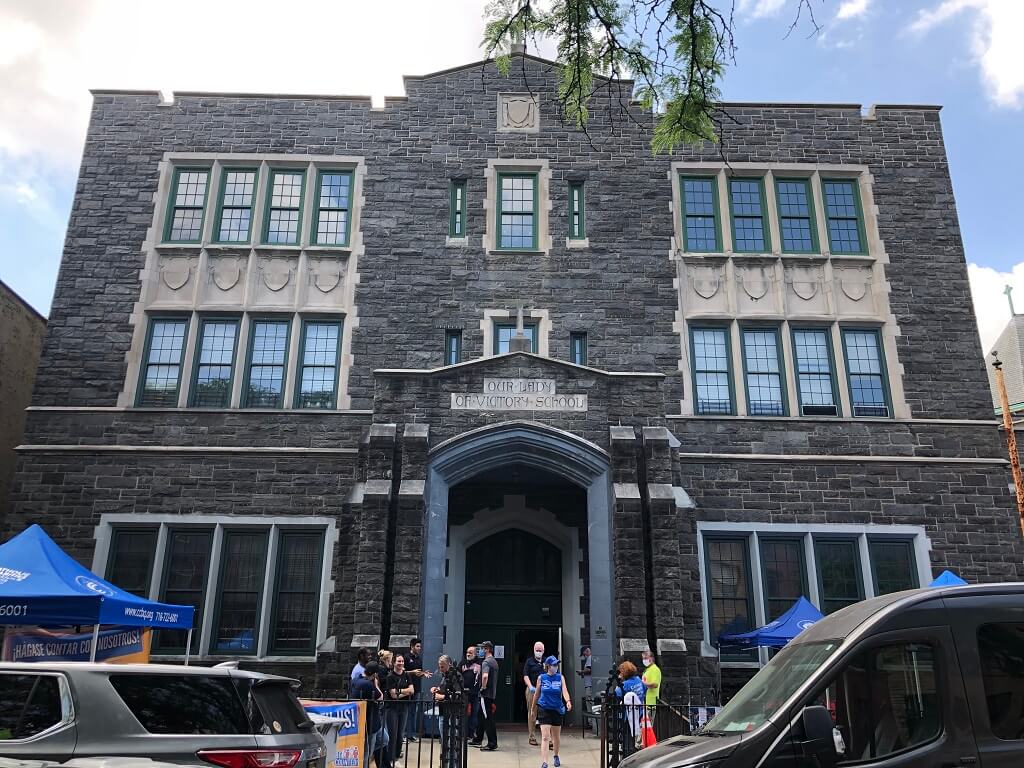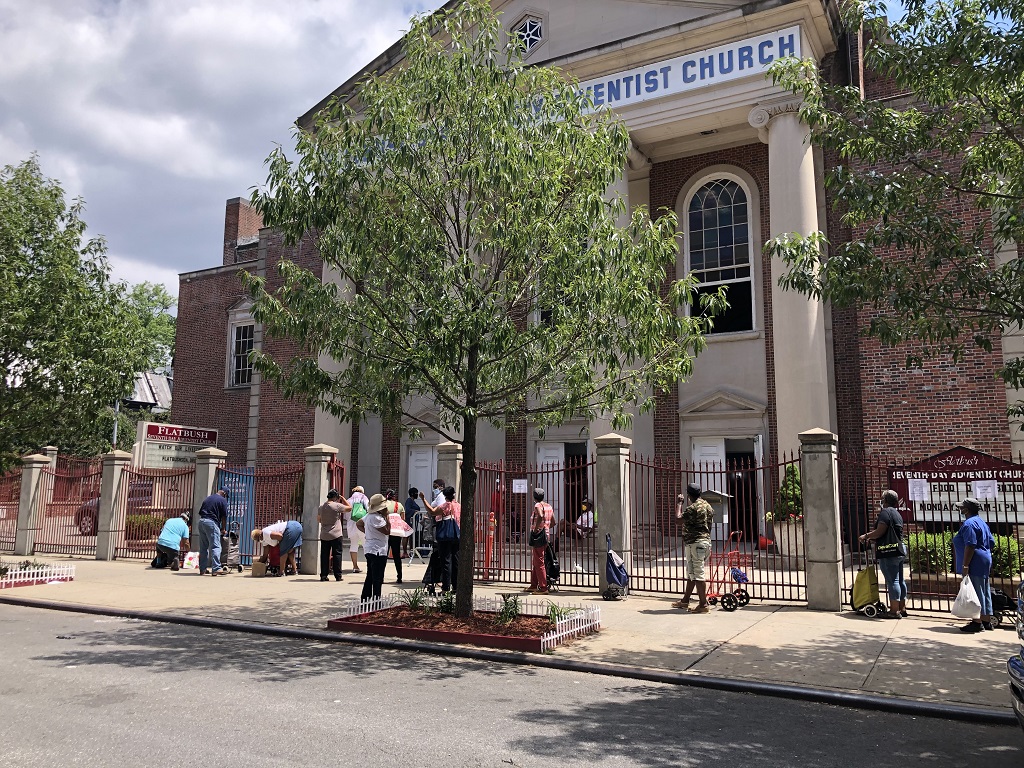Consuelo Morales (an alias) is in a good mood. The groceries she received at the Seventh-Day Adventist Church food pantry in Flatbush was worth the hour-long wait under the midday sun. Morelos is especially pleased with the fish fillets and fresh strawberries in her cart. Fresh food is not always a given at food banks, and it was her first time visiting this one. “I’m glad it’s not just canned goods,” she says in Spanish. Like thousands of New Yorkers, Morelos has turned to pantries in the face of increased food insecurity. A house cleaner, her income has been more than halved since March, when the city-wide shutdown in response to the COVID-19 pandemic began. Her regular clientele is mostly made up of elderly folk. They’re more likely to fall critically ill if they contract the novel coronavirus, she explains, and have therefore been especially observant of social distancing rules. Two of them did call her this week to book appointments, however, and she’s hopeful more will follow as the city slowly begins reopening.
Morelos really likes working with older clients—they’re more considerate, respectful and have less problems than young people, she says. Working with families can be especially chaotic, particularly if they have small children. “Too much commotion.” Her own kids already keep her plenty busy. They’ll like the fish she’s bringing home today, she says. It’s been tough having all four of them cooped up at home since schools closed. Her youngest is 8, and he’s not very enthusiastic about remote learning. He needs a lot of help completing and submitting his homework online, help Morales says his older sisters—ages 23, 18, and 13—don’t have the patience to give him and that she can’t always provide either. “I didn’t go to school and I can’t read very well in Spanish, let alone English.”
She says she can’t rely on her husband, the father of her children, much either. Lately, says Morales, he’s been disappearing for days at a time. When she confronts him, he’ll say he was out with friends. “Really I think he’s seeing someone else.” Not that she really cares about that, she says. She’d been wanting to end the marriage anyway, but she says neither of them can afford to split ways right now—they’re two months behind on rent as it is. Morales didn’t visit food pantries much before the shutdown started. She’s normally very busy and would never have enough time in her day to queue.
Women and the elderly have always been a visible demographic at food pantry lines. Young men are a rarer sight. Not so now, says Jennifer Smith, Food Resource Supervisor for Catholic Charities Brooklyn and Queens. The charity runs 20 parish-based pantries, and Smith says that the increase in the number of young men—many of whom lost jobs in construction or service industries—has been striking. “Men don’t want to come and ask for food,” she says. “A lot of them are very grateful, but very humbled.”
Shawn Ledbetter, a 42-year old audio-video producer based in Bed-Stuy, chanced upon one of the charity’s pop-up pantries at Our Lady of Victory Church on a recent Friday morning. Grateful indeed, Ledbetter says he didn’t hesitate when he walked by the pantry on his way home and a volunteer offered him the free groceries. “Pride is a foolish thing to carry around,” he says. “When it comes to surviving, you swallow your pride and you go get the free bags of food.” Inside the bags, Ledbetter found fresh produce, a whole chicken, and an assortment of healthy perishables. It’s a welcome help, he says. Food is expensive, and the shutdown has dried up his main source of income as a rideshare driver. Before the pandemic, Ledbetter was all but guaranteed a good day’s wage when he hit the road at 5:30 AM to service morning rush-hour passengers. He would normally end his shift around 2 PM, which still left plenty of time to pursue his passion projects—photography, audio-visual storytelling, and growing the media production company he started three years ago. “Life was much, much simpler,” he says.
Perhaps it was too simple. Ledbetter says that losing his main source of income rattled him, but it also made him realize he’d become complacent. The shutdown put a battery in his back, he says, renewing in him a sense of urgency to turn his creativity into his livelihood. “Routine is a vision killer,” he says. “But sometimes you get caught in it. It’s like a hamster on a wheel: you’re not really going anywhere. The virus put a wedge in the wheel and everything broke down.”
Ledbetter says the pandemic has reminded him that money comes and goes, but time is the only resource you really can’t get back. Now that he has more of it, he’s letting his creative side take over. In March, when the city was beginning to shutter, he drove to Midtown Manhattan, where he would normally get a ping from one of his rideshare apps in seconds. Instead, he was met with silence and empty streets. It was then that it dawned on him that he was witnessing history, so he got out of his car and started immortalizing it in his photography. “Penn Station, Grand Central, 42nd Street—quiet, quiet, quiet,” he recalls. “It was amazing.” More recently, in the wake of the Black Lives Matter protests, Ledbetter has been documenting what he sees on the ground with the goal of creating short, informative clips for social media.
If he’s been able to dedicate more time to his creative projects, he says, it’s also because of the many reprieves society, the government, and businesses have extended to people during the shutdown. Thanks to lenient policies implemented by service providers, he says, he hasn’t had to worry about his electric, gas, or phone getting disconnected if he’s behind on his bills. Food pantries are a big help too, and not just for him. “Pantries can remove at least a little bit of worry for a family or a single mother or grandmother. That’s a beautiful thing.” Ledbetter was raised by a single mother in the Bronx and says that he’s no stranger to hardship. This is why he knows that sometimes, all you have to fall back on is your community. The sense of social solidarity that has emerged among people in the city over the past few months, he adds, is a precious silver lining in these difficult times. “It’s a special group of people that organize these things,” he says of the volunteers at Our Lady of Victory.
Linda McGuire (not her real name), an English as a second language teacher in Clinton Hill, holds a similar view. She visits the food pantry run by the local Seventh-Day Adventist Church every week, and describes it as a great neighborhood resource. The pantry saves her around $200 a month. “I don’t have to spend a nickel on groceries.” McGuire, who mostly works with clients who need to work on their English for professional situations like public speaking events or presentations, says she lost half her students when social distancing measures went into effect in March. All her lessons have been virtual since then.
While the remote lessons are fun, McGuire says they’re not as exciting as in-person appointments, where she is also the one learning new things. “It’s so interesting—I get to go to all these different cool places.” Online, her clients can’t always show her the material they need help understanding or editing because they’re usually sensitive internal documents—the type of thing their companies wouldn’t want them sharing. Plus, being at a client’s workplace is often how she meets new students.
Despite the financial setbacks, McGuire isn’t too worried. For her, at least, there’s a light at the end of the tunnel: she’ll be moving to Kuwait in August to teach middle and high school English at an American school there—pandemic notwithstanding. “Kuwait has a very forward-moving culture. They don’t like limitations and they don’t allow circumstances to limit them.” In the meantime, McGuire too is using her extra time to get in touch with her creative side. A foodie with a background in hospitality and restaurant management, she likes coming up with new dishes using the groceries she gets from the food pantry every week.
“Food is my artform, so it’s fantastic,” she says. “I love that food pantry, and it does help. I count that blessing all the time.”












One Comment
Pingback: Meals Pantry Story - fooshya.com